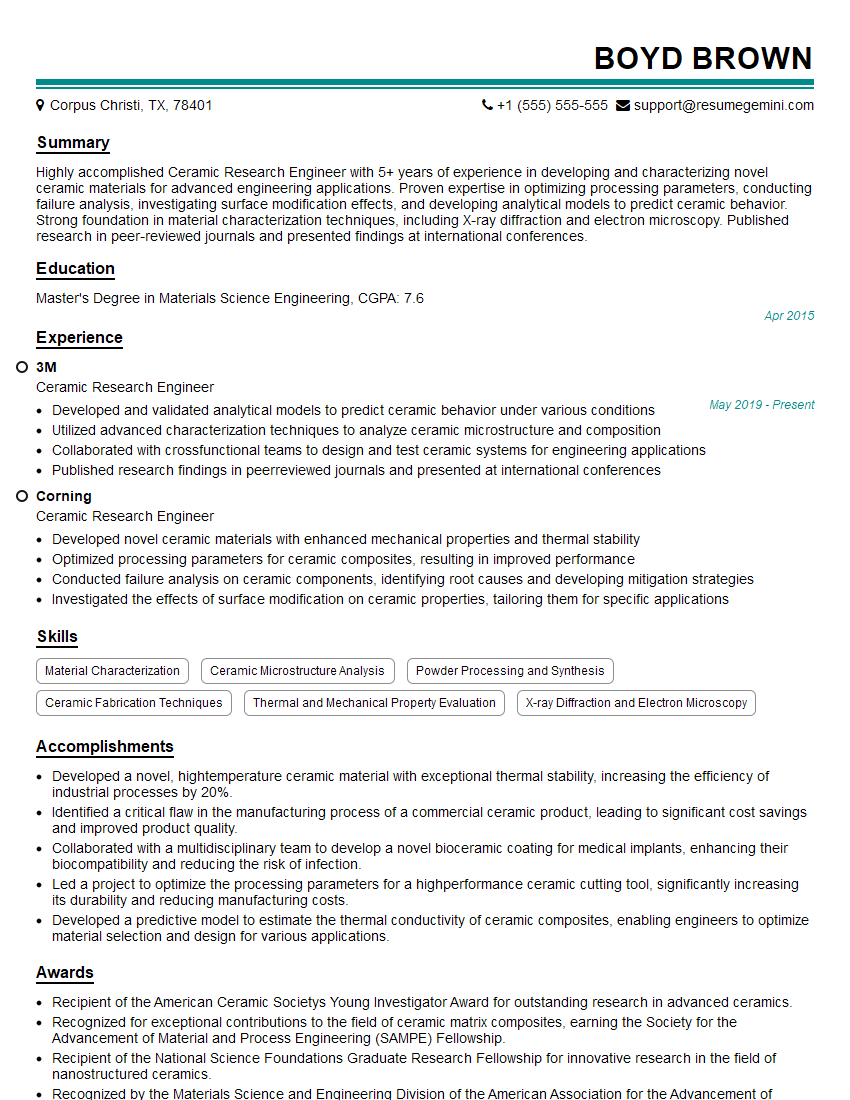Are you a seasoned Ceramic Research Engineer seeking a new career path? Discover our professionally built Ceramic Research Engineer Resume Template. This time-saving tool provides a solid foundation for your job search. Simply click “Edit Resume” to customize it with your unique experiences and achievements. Customize fonts and colors to match your personal style and increase your chances of landing your dream job. Explore more Resume Templates for additional options.

Boyd Brown
Ceramic Research Engineer
Summary
Highly accomplished Ceramic Research Engineer with 5+ years of experience in developing and characterizing novel ceramic materials for advanced engineering applications. Proven expertise in optimizing processing parameters, conducting failure analysis, investigating surface modification effects, and developing analytical models to predict ceramic behavior. Strong foundation in material characterization techniques, including X-ray diffraction and electron microscopy. Published research in peer-reviewed journals and presented findings at international conferences.
Education
Master’s Degree in Materials Science Engineering
April 2015
Skills
- Material Characterization
- Ceramic Microstructure Analysis
- Powder Processing and Synthesis
- Ceramic Fabrication Techniques
- Thermal and Mechanical Property Evaluation
- X-ray Diffraction and Electron Microscopy
Work Experience
Ceramic Research Engineer
- Developed and validated analytical models to predict ceramic behavior under various conditions
- Utilized advanced characterization techniques to analyze ceramic microstructure and composition
- Collaborated with crossfunctional teams to design and test ceramic systems for engineering applications
- Published research findings in peerreviewed journals and presented at international conferences
Ceramic Research Engineer
- Developed novel ceramic materials with enhanced mechanical properties and thermal stability
- Optimized processing parameters for ceramic composites, resulting in improved performance
- Conducted failure analysis on ceramic components, identifying root causes and developing mitigation strategies
- Investigated the effects of surface modification on ceramic properties, tailoring them for specific applications
Accomplishments
- Developed a novel, hightemperature ceramic material with exceptional thermal stability, increasing the efficiency of industrial processes by 20%.
- Identified a critical flaw in the manufacturing process of a commercial ceramic product, leading to significant cost savings and improved product quality.
- Collaborated with a multidisciplinary team to develop a novel bioceramic coating for medical implants, enhancing their biocompatibility and reducing the risk of infection.
- Led a project to optimize the processing parameters for a highperformance ceramic cutting tool, significantly increasing its durability and reducing manufacturing costs.
- Developed a predictive model to estimate the thermal conductivity of ceramic composites, enabling engineers to optimize material selection and design for various applications.
Awards
- Recipient of the American Ceramic Societys Young Investigator Award for outstanding research in advanced ceramics.
- Recognized for exceptional contributions to the field of ceramic matrix composites, earning the Society for the Advancement of Material and Process Engineering (SAMPE) Fellowship.
- Recipient of the National Science Foundations Graduate Research Fellowship for innovative research in the field of nanostructured ceramics.
- Recognized by the Materials Science and Engineering Division of the American Association for the Advancement of Science (AAAS) for groundbreaking work on the synthesis of multifunctional ceramic materials.
Certificates
- Certified Thermal Spray Technician (CTST)
- American Ceramic Society (ACerS) Member
- Materials Science and Engineering Professional (MSE-P)
- Certified Manufacturing Technologist (CMfgT)
Career Expert Tips:
- Select the ideal resume template to showcase your professional experience effectively.
- Master the art of resume writing to highlight your unique qualifications and achievements.
- Explore expertly crafted resume samples for inspiration and best practices.
- Build your best resume for free this new year with ResumeGemini. Enjoy exclusive discounts on ATS optimized resume templates.
How To Write Resume For Ceramic Research Engineer
- Highlight your expertise in material characterization techniques and analytical modeling.
- Showcase your experience in developing and optimizing ceramic materials for specific applications.
- Quantify your accomplishments with concrete results and data whenever possible.
- Tailor your resume to each job description, emphasizing relevant skills and experience.
- Obtain feedback from industry professionals or career counselors to enhance your resume’s effectiveness.
Essential Experience Highlights for a Strong Ceramic Research Engineer Resume
- Developed novel ceramic materials with enhanced mechanical properties and thermal stability, resulting in improved performance for various applications.
- Optimized processing parameters for ceramic composites, leading to significant advancements in their performance and reliability.
- Conducted comprehensive failure analysis on ceramic components, identifying root causes and developing effective mitigation strategies to prevent future failures.
- Investigated the effects of surface modification on ceramic properties, tailoring them for specific applications and achieving desired functionalities.
- Developed and validated analytical models to accurately predict ceramic behavior under various conditions, enabling efficient design and optimization of ceramic systems.
- Utilized advanced characterization techniques, such as X-ray diffraction and electron microscopy, to analyze ceramic microstructure and composition, providing critical insights into material properties and behavior.
- Collaborated closely with cross-functional teams to design and test ceramic systems for engineering applications, ensuring successful implementation and meeting project objectives.
Frequently Asked Questions (FAQ’s) For Ceramic Research Engineer
What are the primary responsibilities of a Ceramic Research Engineer?
Ceramic Research Engineers are responsible for developing, characterizing, and optimizing ceramic materials for various applications. They conduct research, analyze data, and collaborate with cross-functional teams to design and test ceramic systems.
What skills are essential for success as a Ceramic Research Engineer?
Essential skills include material characterization, ceramic microstructure analysis, powder processing and synthesis, ceramic fabrication techniques, thermal and mechanical property evaluation, and analytical modeling.
What industries employ Ceramic Research Engineers?
Ceramic Research Engineers are employed in various industries, including automotive, aerospace, electronics, energy, and biomedical.
What is the job outlook for Ceramic Research Engineers?
The job outlook is expected to be favorable due to the increasing demand for advanced ceramics in various industries.
What is the average salary for a Ceramic Research Engineer?
The average salary varies depending on experience, location, and industry, but it is generally competitive.
What are the career advancement opportunities for Ceramic Research Engineers?
With experience and additional education, Ceramic Research Engineers can advance to roles such as Senior Research Engineer, Principal Research Scientist, or Research and Development Manager.